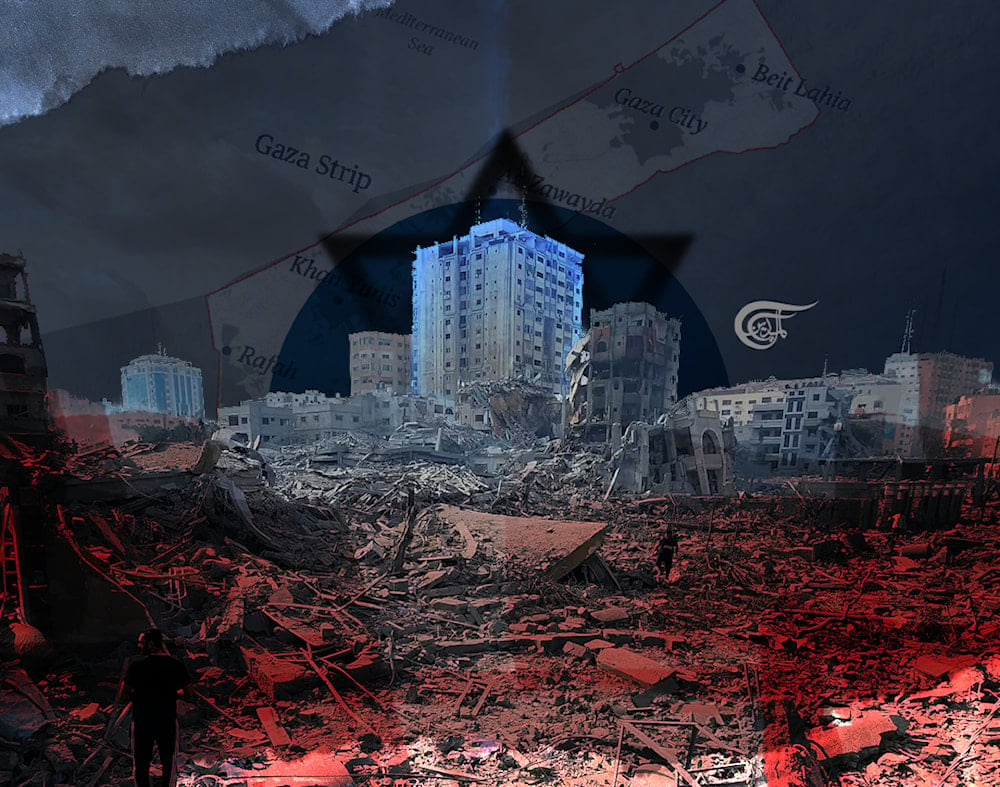How long until the West succeeds in triggering an Iranian overreaction
Gaza's devastation serves as a stark warning of the brutal costs of resisting Western dominance.
-

Unchecked, Gaza's suffering signals to Iran that the pathway of resistance will be met not with dialogue but with war. (Al Mayadeen English; Illustrated by Ali Al-Hadi Shmeiss)
The Middle East has long been defined by imperial entrenchment and systemic violence, with Iran's autonomy increasingly under siege by Western powers—primarily the United States and its regional proxy, "Israel."
Framed as a containment of Iranian influence, this perpetual confrontation is less a matter of security than a calculated war on Iran's sovereign right to economic self-determination and political agency within its borders and regional alliances.
The devastation in Gaza, far from an isolated tragedy, emerges as a deliberate cautionary tale—a grim forecast for Iran should it continue to resist integration into Western capital's orbit.
Marked by staggering loss of life and destruction, this scenario represents an open threat to Iran: the cost of rejecting imperial subjugation is to face the full violence of a system determined to suppress autonomous development in the region.
War at all costs
Unchecked, Gaza's suffering signals to Iran that the pathway of resistance will be met not with dialogue but with war.
Here, "Israel's" systematic targeting of Resistance leaders within Palestinian and Lebanese Resistance movements has eliminated even the pretense of negotiation.
The relentless assassinations of figures within Hamas and Hezbollah, the stalwarts of anti-imperial defiance, effectively convey "Israel's" commitment to escalate tensions toward open conflict, irrespective of human cost.
This strategy sends a clear message to Iran: defiance will be met with force, pushing Tehran toward a confrontation that may ultimately serve as a pretext for its subjugation.
Strategy of Restraint
Historically, Iran has tempered its responses, seeking diplomatic recourse even under extreme provocation.
Despite relentless economic sanctions and punitive isolation, Iran has continually called for the resumption of the Joint Comprehensive Plan of Action (JCPOA) as a route to diplomatic resolution, reflecting a strategic pursuit of stability that sidesteps the ravages of war.
Grounded in pragmatism, such an approach has enabled Iran to support its regional alliances without succumbing to the full-scale military entrapment that Western powers hope to provoke.
Yet, restraint comes with a price. As Western and Israeli provocations intensify—compounded by the unfolding humanitarian crisis in Gaza and the targeting of Iran's network of allies—Iran's capacity to remain measured is increasingly challenged.
The material devastation inflicted on its allies and the targeted obliteration of political solidarity across the region intensify the pressure on Iran to react, or risk appearing as passive in the face of a brutal, unchecked imperialist onslaught.
Calculated Provocations
The strategies of provocation employed by Western powers, from economic asphyxiation to stirring internal dissent and direct military actions against Iran's allies, reveal a slow yet deliberate plan to corral Iran into a reaction that can be framed as aggression.
Attempts to instigate a color revolution, along with sabotage operations and strategic assassinations, form a layered approach aimed at undermining Iran's sovereignty and security, all in pursuit of a pretext to intensify isolation and justify further intervention.
Read more: Dirty money: Meet the US agent driving the CIA-led riots in Iran
Faced with this sustained assault, Iran's choices are fraught with peril.
Any overreaction could furnish the very justification the West seeks to initiate direct military intervention or compound sanctions, while inaction risks diminishing Iran's standing among allies and the broader anti-imperialist movements it supports.
In either case, the stakes are high: the imperial powers appear intent on eliminating all forces of autonomous resistance, even at the expense of a humanitarian catastrophe of staggering proportions.
The High Stakes of Provocation
The crises in Gaza and Lebanon are more than regional conflicts; they are a high-stakes game of provocation.
The West, by attempting to corner Iran, risks igniting a broader conflagration that could engulf the entire region.
What is at stake is not merely a geopolitical standoff but a dangerous escalation that could spiral into an irreparable humanitarian disaster.
Whether Iran will be maneuvered into overreaction remains uncertain.
Yet the continued suffering in Gaza and systematic dismantling of Iran's alliances expose a dangerous resolve among Western powers—a resolve that, if left unchecked, could spiral into devastation with far-reaching human and political costs.
Read more: Existential threat may pose nuclear doctrine change: Iran's Kharrazi

 4 Min Read
4 Min Read








